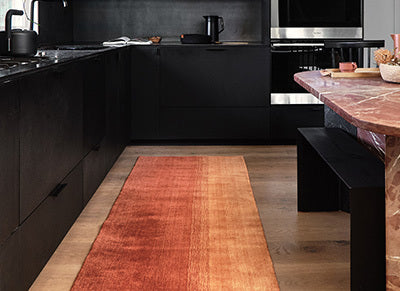














One-of-a-kind vintage rug, hand-knotted in Kars, Turkey
Dimensions: 5'12" x 8'4" (182 cm x 253 cm)
Sigitas has been professionally cleaned; age-related wear and natural inconsistencies are inherent in these unique, handcrafted vintage rugs
Rug Type:
-
Hand-knotted Rugs
Sturdy pile rugs meticulously woven by hand, with individually hand-tied knots, so no two are exactly alike
Age:
-
Vintage
Typically between 20-100 years old
Main Color:
- Blue
One-of-a-kind vintage rug, hand-knotted in Kars, Turkey
Sigitas has been professionally cleaned; age-related wear and natural inconsistencies are inherent in these unique, handcrafted vintage rugs
- Only one in stock
- 100% wool
- Dimensions: 5'12" x 8'4" (182 cm x 253 cm)
- Low pile: approximately 0.2" (0.5 cm)
- Color palette: baby blue, dark dusty rose pink, cream, chartreuse, navy
- A variation of motifs—simple, tribal, bold, and colorful—all hailing from the Anatolian region (modern-day Turkey)
- Lined with a repeating set of three medallions to create multiple points of visual interest and direction
- Artisanal and tribal, geometric designs feature angular edges and simple shapes—like diamonds, squares, lattices, and stylized animals
- Floral motifs are a staple in rug design—showing up in a variety of styles including natural, abstract, and geometric
Kars, found in the easternmost part of Turkey (near the Caucasus border), is known for its rugs woven with modified Caucasian designs. Almost always constructed with an all-wool foundation, these rugs are coarsely woven in either earth-toned natural wool colors (like cream, gray, and brown) or pastel pinks and blues.
Material DetailsWool is the most widely used fiber in Turkish rug design. Not only is it plentiful in supply, it’s durable, long-lasting, and incredibly soft—so it’s super comfy to walk and relax on.
- We recommend that you regularly vacuum your rug to remove dirt and grime. Depending on how heavily your rug is used, just once or twice a month is adequate. Too much vacuuming can wear down the knots and fibers more quickly. If you have a suction attachment on your vacuum cleaner, use that instead of a rotary vacuum.
- Every few months, you’ll also want to flip your rug over and vacuum the back to get the grit out of the foundation of the rug. It also helps to rotate your rug once a year to ensure even wear over time.
- Every 3-5 years, we recommend getting your rug professionally hand-washed. Please do not take it to get steam or dry cleaned—this will almost certainly damage the rug! Hand-washing requires the use of a pH-balanced shampoo, worked into the rug by hand with a soft-bristled brush, before being rinsed thoroughly. This process should be repeated a few times.
- In case of spills:
- If the spill is organic and non-oily (e.g., wine), use a paper towel or cloth to blot the liquid. Add some clean water sparingly to the spot to dilute the stain (or wet a paper towel or cloth) and blot. Repeat this process until the stain is removed.
- If the stain is persistent, resist the urge to scrub. Scrubbing can damage the wool fibers and more easily allow the stain to penetrate. You may try using a mild detergent, such as very diluted dishwashing soap, following the same blot-and-rinse procedure.
- If the spill is a denser, more oily liquid, try first to scoop what you can from the surface using a spoon or perhaps some heavier paper, and then do the blot-and-rinse. If the spill is significant, non-organic and/or composed of chemical substances, or the above methods don’t work, we suggest getting the rug professionally hand-washed as soon as possible.
- For rugs with deeply saturated color palettes, be sure to spot-clean them in an area that can be hosed down immediately after, as some color bleeding may occur.
Order A Sample
Sigitas - Rug Sample
Size 12" x 12"
Free shipping & return
One-of-a-kind Turkish Rugs
Our Turkish rugs are each one-of-a-kind. Many are made between 30 and 100 years ago, and curated by us. Others are fresh off the loom using traditional techniques. Known for their intricate patterns and tight, sturdy weaves, what began as a homemade, everyday comfort ultimately became a robust industry, embodying a profound artistic expression of Turkey's culture.
Recently Viewed
Sigitas Vintage Turkish Rug
Don’t forget to bundle up! Buy 2 or more rugs, get 20% off your rugs.
![]() Free Shipping
Free Shipping
![]() Easy Returns
Easy Returns
One-of-a-kind vintage rug, hand-knotted in Kars, Turkey
Dimensions: 5'12" x 8'4" (182 cm x 253 cm)
Sigitas has been professionally cleaned; age-related wear and natural inconsistencies are inherent in these unique, handcrafted vintage rugs
One-of-a-kind vintage rug, hand-knotted in Kars, Turkey
Sigitas has been professionally cleaned; age-related wear and natural inconsistencies are inherent in these unique, handcrafted vintage rugs
- Only one in stock
- 100% wool
- Dimensions: 5'12" x 8'4" (182 cm x 253 cm)
- Low pile: approximately 0.2" (0.5 cm)
- Color palette: baby blue, dark dusty rose pink, cream, chartreuse, navy
- A variation of motifs—simple, tribal, bold, and colorful—all hailing from the Anatolian region (modern-day Turkey)
- Lined with a repeating set of three medallions to create multiple points of visual interest and direction
- Artisanal and tribal, geometric designs feature angular edges and simple shapes—like diamonds, squares, lattices, and stylized animals
- Floral motifs are a staple in rug design—showing up in a variety of styles including natural, abstract, and geometric
Kars, found in the easternmost part of Turkey (near the Caucasus border), is known for its rugs woven with modified Caucasian designs. Almost always constructed with an all-wool foundation, these rugs are coarsely woven in either earth-toned natural wool colors (like cream, gray, and brown) or pastel pinks and blues.
Material DetailsWool is the most widely used fiber in Turkish rug design. Not only is it plentiful in supply, it’s durable, long-lasting, and incredibly soft—so it’s super comfy to walk and relax on.
- We recommend that you regularly vacuum your rug to remove dirt and grime. Depending on how heavily your rug is used, just once or twice a month is adequate. Too much vacuuming can wear down the knots and fibers more quickly. If you have a suction attachment on your vacuum cleaner, use that instead of a rotary vacuum.
- Every few months, you’ll also want to flip your rug over and vacuum the back to get the grit out of the foundation of the rug. It also helps to rotate your rug once a year to ensure even wear over time.
- Every 3-5 years, we recommend getting your rug professionally hand-washed. Please do not take it to get steam or dry cleaned—this will almost certainly damage the rug! Hand-washing requires the use of a pH-balanced shampoo, worked into the rug by hand with a soft-bristled brush, before being rinsed thoroughly. This process should be repeated a few times.
- In case of spills:
- If the spill is organic and non-oily (e.g., wine), use a paper towel or cloth to blot the liquid. Add some clean water sparingly to the spot to dilute the stain (or wet a paper towel or cloth) and blot. Repeat this process until the stain is removed.
- If the stain is persistent, resist the urge to scrub. Scrubbing can damage the wool fibers and more easily allow the stain to penetrate. You may try using a mild detergent, such as very diluted dishwashing soap, following the same blot-and-rinse procedure.
- If the spill is a denser, more oily liquid, try first to scoop what you can from the surface using a spoon or perhaps some heavier paper, and then do the blot-and-rinse. If the spill is significant, non-organic and/or composed of chemical substances, or the above methods don’t work, we suggest getting the rug professionally hand-washed as soon as possible.
- For rugs with deeply saturated color palettes, be sure to spot-clean them in an area that can be hosed down immediately after, as some color bleeding may occur.






